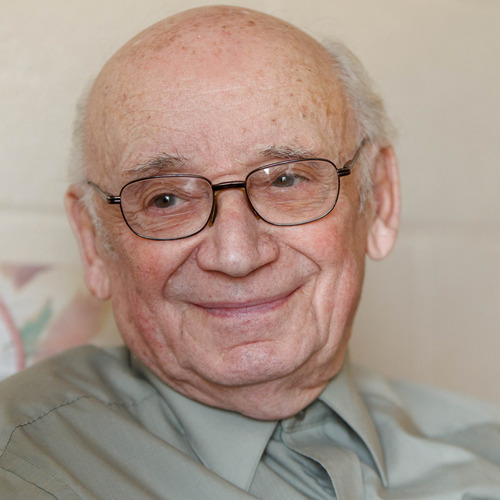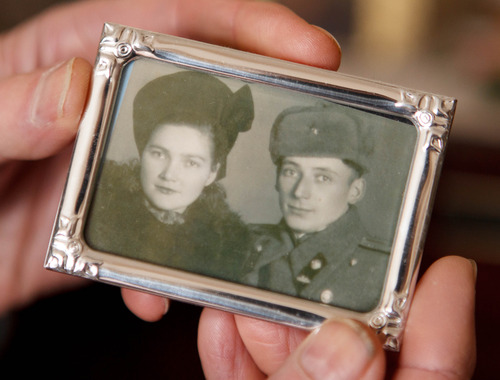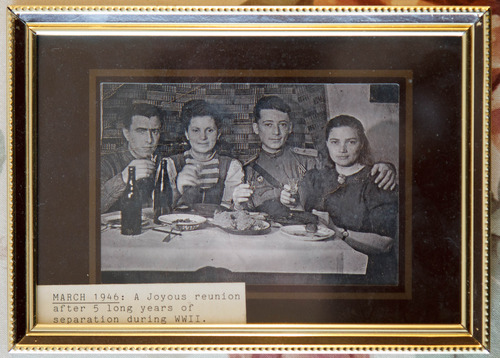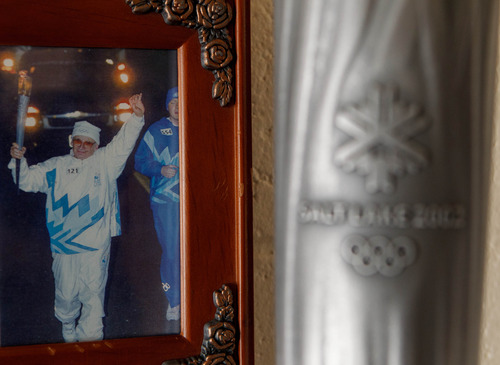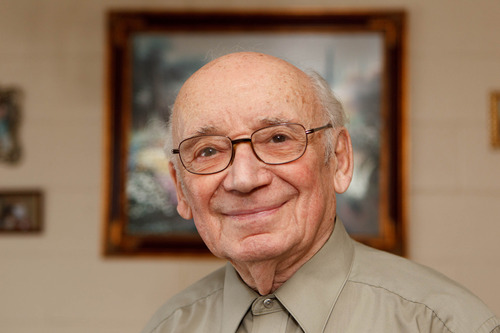This is an archived article that was published on sltrib.com in 2013, and information in the article may be outdated. It is provided only for personal research purposes and may not be reprinted.
To boost his spirits after his wife died 2½ years ago, Leon Shaposhnikov wrote a list of everything for which he is grateful.
He is thankful he returned in one piece from serving in the Soviet military during World War II. He feels lucky that his wife waited with his mother nearly five years for his return from that war — despite being notified that he was missing in action.
And he's fortunate, he wrote, that he immigrated to Salt Lake City in 1979, where the Jewish community at Congregation Kol Ami embraced him.
"I feel a big support from the congregation," Shaposhnikov said. "I feel like around me, this is my family."
It's a family and a congregation that will help Shaposhnikov on Saturday celebrate a somewhat-unusual undertaking for a 93-year-old: his bar mitzvah.
Saturday is the 80th anniversary of Shaposhnikov's first bar mitzvah in Romania at the traditional age of 13. It's also his birthday. In Judaism, a bar mitzvah marks the entry of a Jewish child into the adult Jewish world.
To honor that day, his Jewish faith and the freedom to worship that he's enjoyed in America for more than 30 years, Shaposhnikov will lead the synagogue service Saturday, chanting Hebrew blessings and readings much as he did 80 years ago.
Shaposhnikov remembers his first bar mitzvah as pretty typical. But that event was before he had really lived, before he knew how dramatically his life would change. It was before he saw his homeland taken over by Soviets, before he had his own family and before he felt the need to escape to the U.S. for his children's sake.
"That he's been through war and all these trials and tribulations in his life and yet we get to celebrate with him," said Kol Ami Rabbi Ilana Schwartzman, "is incredible."
—
A time of change, war • The drastic changes to Shaposhnikov's life began about seven years after his first bar mitzvah. That was when Romania ceded territory to the Soviet Union.
"We went to bed Romanian Jews," said Shaposhnikov in accented English, one of five languages he speaks, "and we woke up Russian Jews."
Shaposhnikov was quickly drafted into the Soviet military and forced to leave Sonia, his wife of just four months who was pregnant with the couple's first child.
Shaposhnikov would never meet that boy. Sonia gave birth during her husband's absence, and their son died at age 2. The couple had no idea they would go nearly five years without laying eyes on each other.
"We didn't know the war would be so long," Shaposhnikov said.
He wasn't allowed to return home for visits and couldn't write letters for three years. At one point, Sonia even received a correspondence stating that her husband was MIA. But she remained steadfast, living with his mother. They held out hope for the return of Shaposhnikov, an only child, even as they moved around, trying to evade the advancing German army.
For Shaposhnikov, it was a tough five years. He carried a grenade during the war so he could end his own life — if need be — rather than be captured. But he rose quickly through the ranks and became a captain.
After the war, Shaposhnikov reunited with his family. He stayed in the military for a number of years, and the family eventually moved back to his hometown of Kishinev.
There, the couple reared two daughters, Rita and Alexandra. Shaposhnikov went to school to study finance and became a banker.
But the family still lacked one major thing: freedom.
—
A tremendous journey • When Kishinev, Romania, fell under Soviet control in 1940, religious freedom ceased to exist, Shaposhnikov said.
He and his family could not openly practice Judaism, and, through the years, anti-Semitism there grew. By the 1970s, it was difficult for Jews to get into college to become professionals, and they were discriminated against in the workplace.
Shaposhnikov had made a decent life for himself in Kishinev working in finance, but he and his grown children worried for their future.
That's why at age 60 — a time when many think of retirement — Shaposhnikov, accompanied by his wife, his two grown daughters and their families, immigrated to Salt Lake City, where one of their in-laws already lived.
"We really were scared, with no money coming to a new country, no language," recalled Shaposhnikov's daughter Alexandra Mitelman, who was 27 at the time and now lives in New York.
Shaposhnikov couldn't take his money with him, and his training and former military status in Russia meant little in the U.S. He knew three words of English: hi, bye and OK.
"I left everything for the future of my children, not for me," said Shaposhnikov, now a grandfather of five and great-grandfather of four.
Ten days after moving to Utah, he was offered a job as a custodian at Kol Ami, a position he now jokingly refers to as "maintenance engineering."
"I said I will do [anything], but I have to survive."
The congregation soon fell in love with Shaposhnikov, a friendly man, quick with a smile, and his wife, who worked in Kol Ami's kitchen. Shaposhnikov labored at the synagogue for 17 years.
But even in his late 70s, he wasn't ready to retire. He worked for another eight years, including as an office clerk for the Salt Lake Organizing Committee for the 2002 Winter Olympics.
When it came time for his SLOC colleagues to decide who among them would carry the Olympic torch along part of its journey to Salt Lake City, they chose Shaposhnikov. They paid his way, determined to see the kind former Soviet who had moved to America in search of freedom bear the flame.
"He had very prestigious jobs he gave up to come here for freedom," said close friend Ed Bronsky, who was part of a committee that helped Russian Jews resettle in Utah. That's how he met Shaposhnikov more than 30 years ago. Like so many others who have encountered Shaposhnikov, he became a lifelong friend.
—
Deep roots • Now, more than a decade after the Salt Lake City Olympics, the torch stands displayed in a corner of Shaposhnikov's modest but tidy Sugar House apartment.
It's the same small apartment where he's lived for 32 years, and its walls tell the story of his life here and in the Soviet Union.
A large black-and-white photo of his family taken after the war hangs above his bedroom dresser. A smaller picture, taken during the war, of Sonia and their young son hangs beneath it. Another wall bears a plaque of appreciation awarded to him by Kol Ami for his years of service there.
"I'm lucky I came to Utah," he said. "I'm lucky I worked for the community, and I became a part of the community."
For years, his family members were forced to keep their Judaism concealed. But when they moved to Salt Lake City, they were suddenly free to worship again.
For Shaposhnikov, that faith all came rushing back.
"They tried to uproot my religion," he said of the Soviet leaders. "They tried to cut the branches. They cut the trunk, but the roots [were] left. I arrived here, and it began to get new sprouts."
In 1988, about nine years after his arrival to the U.S., Shaposhnikov exercised his newfound religious freedom by chanting a reading, at Kol Ami, from his original bar mitzvah on the anniversary of it. It was a ritual he would repeat a dozen times in the years to come.
He still remembered how to read Hebrew, a skill he learned attending religious school before Romania fell under the Soviet grip.
"I feel like awake after 39 years," he said of experiencing religious freedom after living for nearly 40 years under communist rule, "and now I want to dedicate my bar mitzvah in memory of my parents, my grandparents, because they gave me the Jewish education."
This year, he planned to do the reading again — just as he had in years past. But when his Kol Ami friends learned this year would mark the 80th anniversary of his first bar mitzvah, they wanted to ensure it didn't go unnoticed.
"We said, 'Leon, we should make a big deal of this,' " Rabbi Schwartzman said.
In honor of the big anniversary, Shaposhnikov will chant the full readings. The congregation has ordered yarmulkes (in green, Shaposhnikov's favorite color) inscribed with his name and the date to honor the occasion. After the Saturday service, they'll hold a celebration in his honor.
To prepare for the event, Shaposhnikov has been practicing the readings twice a day, five days a week for months.
In one of the readings, the prophet Isaiah warns the Jewish people to stop straying so far from the ways of God, though they're exiled from the holy land. Isaiah tells them that when they have full faith in God and heed his commandments, they can return to God and he'll accept them.
It's something Shaposhnikov has, in a sense, experienced personally.
Though exiled from Judaism for decades, it was there waiting, ready to embrace him when he returned.


